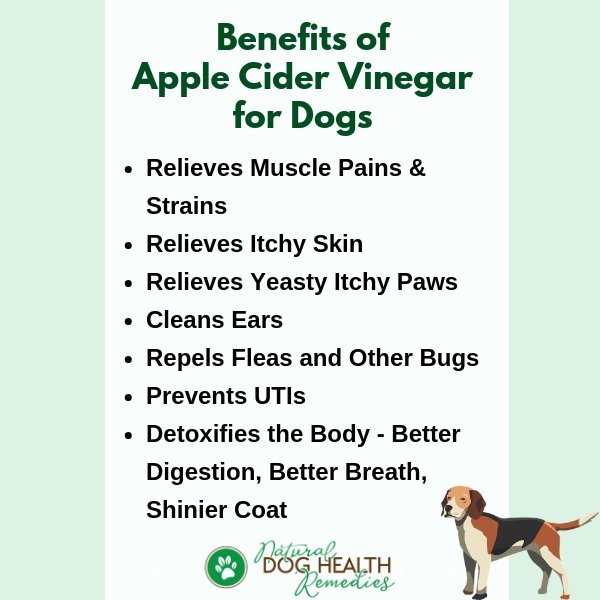Apple Cider Vinegar for Dogs

Overview
Over the years, apple cider vinegar has gained popularity and attention as it has been found to have a lot of health benefits for people. Now it has been found that the benefits of apple cider vinegar for dogs are great as well.
This page takes a closer look at the following topics:
- Apple cider vinegar facts
- What are the benefits of apple cider vinegar for dogs?
- What are some common uses of ACV on dogs?
- Which apple cider vinegar should we get for our dogs?
- Is ACV safe for dogs?
Apple Cider Vinegar Facts
Apple cider vinegar (ACV) is a type of vinegar made by the fermentation of apple cider. Fermentation is a process in which sugars in a food are broken down by bacteria and yeast.
In the first stage of fermentation, the sugars in the apple cider are turned into alcohol. Then, if the alcohol ferments further, you get vinegar.
The main ingredient of apple cider vinegar is acetic acid, as well as some lactic, citric and malic acids.
Many people believe that ACV is rich in vitamins, minerals, and more. But according to the USDA, ACV is rich in potassium but does not contain all the other nutrients that many sources claim it does.
While on its own, ACV may not be as full of nutrients as many people think, but when combined with foods that are nutrient-rich, ACV helps the body assimilate such nutrients. So we can safely say that ACV is an important digestive aid, both for people and dogs.
The color of ACV is light yellow-brown. It is often sold unfiltered and unpasteurized with the "mother" which is a dark, cloudy sediment settled at the bottom of the bottle. It has a pH of around 4.25 and 5.
Benefits of Apple Cider Vinegar to Dogs
There are numerous health benefits of apple cider vinegar for dogs. The main ones are:
- ACV is anti-bacterial, anti-fungal, and antiseptic. It helps prevent bacterial and viral growth in the digestive tract. In addition, it does not upset the balance of the friendly bacteria inside the GI tract.
 As a result, apple cider vinegar boosts the immune system. It improves stamina, increases resistance to diseases, prevents common infections, and is therefore helpful for dogs with weakened immune systems.
As a result, apple cider vinegar boosts the immune system. It improves stamina, increases resistance to diseases, prevents common infections, and is therefore helpful for dogs with weakened immune systems. - ACV normalizes the blood's acid alkaline balance and its potassium-rich ingredients remineralize the body. ACV breaks down calcium deposits in a dog's joints and remineralizes the bones, and as such it is beneficial for dogs with arthritis and joint problems such as hip dysplasia.
- Another benefit of apple cider vinegar for dogs is its effect on a dog's skin and coat due to ACV's detoxifying properties. It is an effective itching remedy. Dogs with itchy skin caused by allergies (e.g. seasonal allergies, flea allergies) can get almost instant relief if ACV is used as an after-shampoo rinse.
- Because ACV is rich in potassium, it is beneficial for dogs with diuretic or heart problems.
- Apple cider vinegar also balances digestive enyzymes in the body, so it is a good remedy for food poisoning and digestive upsets such as intestinal gas and constipation. It also reduces fecal odors.
- Other benefits of ACV include the prevention of bladder stones, kidney infections, and UTIs.
Common Uses of Apple Cider Vinegar on Dogs
Apple cider vinegar can be used in various ways to treat dog health problems. Some common uses include:
General Detoxifier
Use ACV as a general detoxifier and a mild tonic. Long term use of ACV will make your dog more resistant to infections, as well as flea or worm infestations.
Start by putting small amounts of ACV in your dog's drinking water. Slowly build up to about 1 teaspoon of ACV per 15 pounds of body weight.
Some dogs may not like the taste of vinegar in their water. If that's the case for your dog, mix ACV with his food, or mix it with a teaspoonful of raw honey.
Within one month or so, you can see whether ACV is actually helping your dog. Many dog parents have reported improvements in their dog's health conditions, such as better skin conditions (less scratching and odor), better digestion and better dog breath, reduced flea population, fewer or total elimination of tear stains on the face, and less painful joints (in older dogs).
Muscle Pains and Strains
The anti-inflammatory properties of ACV help reduce muscle pain and inflammation. The acid's cooling effects also help soothe and relax the muscles.
For sore muscles or muscle strain, apply a compress of ACV to the affected area for 15 minutes or so. Do it 2-3 times a day.
If you want something stronger, try making a vinegar herbal liniment. Here is an example suggested by C.J. Puotinen (author of Natural Remedies for Dogs and Cats, and The Encyclopedia of Natural Pet Care):
You need:
- 2 cups ACV
- 1 teaspoon powdered cayenne pepper
- 4 tablespoons dried rosemary (or 1/4 cup fresh)
- 2 tablespoons dried comfrey leaf (or 1/8 cup fresh)
Instructions:
- Combine the ACV and herbs in a jar.
- Leave the sealed jar in a warm place for a month or longer.
- Strain the liquid through cheesecloth.
- Shake well before using, and avoid using it near the eyes and mucous membranes.
Use this liniment to massage into bruises, sore muscles or joints, or make a compress by soaking a small clean washcloth in the liniment. Apply it to the affected area for as long as your dog allows you!
Rinse for Dog Itchy Skin
Use ACV as an after-shampoo rinse if your dog has itchy skin problems such as allergies, fleas, or ringworm.
To make the vinegar rinse: Add 2 tablespoons of apple cider vinegar to a quart of water. Use it once a week as an after-shampoo rinse. Remember not to use water to rinse off the ACV - just towel your dog dry.
You can also use ACV as a foot soak for itchy dog paws due to seasonal allergies (e.g. pollen). Dilute 1 cup of ACV with 1-2 cups of water and let your dog soak his paws in the mixture. This can greatly reduce the itching.
If your dog has dandruff, try massaging full-strength ACV into his hair coat before shampooing.
For minor skin irritations, such as sunburn, calluses, abrasions, you can simply apply full-strength ACV to the affected area(s).
Ear Wash
If your dog is prone to ear infections, keep your dog's ears clean by using apple cider vinegar. Use a dropper to put a few drops of ACV in each ear and gently massage the base of the ears. This will clean out the debris and the vinegar will maintain a healthy pH level in the ears.
Flea Repellent Spray
Apple cider vinegar can also help repel fleas on dogs.
You can prepare a spray by simply using 50% apple cider vinegar and 50% water. Use a spray bottle and spray your dog's coat before his daily walks (avoid the eyes, nose, and mouth), and you can use it to spray his bedding as well.
Note: If you have a dog with light-colored hair, the cider vinegar will stain the dog's coat.
Herbal ACV Coat Tonic
For added strength, try adding herbs to apple cider vinegar. Use herbs that have anti-bacterial and anti-septic properties.
For example, this herbal vinegar coat tonic is good for all dogs (except those with light or white fur). It can improve coat condition, soothe irritated skin, and as an added bonus, repel bugs and heal sores.
Get a combination of any of these herbs (fresh or dried): lavender (flowers or stalks), rosemary leaves, lemon peel, sage, calendula blossoms, and chamomile.
Put the herbs in a glass jar (fill the jar only half full if you are using dried herbs). Then pour in ACV to cover the herbs.
Seal the jar tightly and leave it in a warm place for about 2 weeks.
Strain the liquid through cheesecloth into a large measuring cup and transfer the strained herbal ACV to glass storage bottles. Store in a cool dark place and remember to shake well before using.
To use this herbal ACV as a rinse, dilute it with an equal quantity of water and pour the liquid all over your dog (except the head) after shampoo and let the coat air-dry.
As a bug repellent, pour a little of this herbal ACV onto a damp washcloth and wipe your dog's coat.
For itchy, irritated skin, apply directly on the affected areas.

Which is The Best Vinegar for Dogs?
Not all vinegars have the same benefits. Do not use a vinegar that is clear such as wine vinegar, sushi vinegar, etc. that can be found in most supermarkets. These types of vinegar are "dead" because they do not contain any enzymes and other live factors as found in unpasteurized ACV.
The best apple cider vinegar for dogs is one contains the "mother", i.e. one that is raw, unpasteurized, unheated, and organic. You can find organic ACV in health food stores or online.
Is Apple Cider Vinegar Safe for Dogs?
Apple cider vinegar, when used in appropriate amount, is safe for dogs with one exception. Dogs with a chronic yeast infection (Candida) or those with an overly acidic system or irritated intestines are not recommended. Vinegar is believed to reactivate or worsen these conditions.
Other precautions when using ACV on your dog:
- Never give undiluted apple cider vinegar for your dog to drink. Adding ACV to your dog's drinking water is a good way to dilute it.
- When using it as a rinse, take care not to let it get into your dog's eyes.
- Also, do not use ACV on open wounds such as cuts or scratches as it will burn.
C.J. Puotinen, Natural Remedies for Dogs and Cats (Keats Publishing, 1999).
R.H. Pitcairn, The Complete Guide to Natural Health for Dogs and Cats (Rodale, 2005).
Check out this page for more information.





